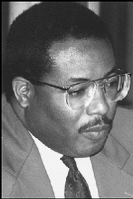
Hylton
MINISTER OF Foreign Trade, Hon. Anthony Hylton has described his major portfolio responsibility as "to equip and prepare our nation to meet the challenges of the new global environment for trade."
Making his first presentation as a full Minister to the Sectoral Debate last Wednesday in Parliament, Mr. Hylton, a release from his Ministry said, gave an overview of the work being done in the area of foreign trade and spelt out the objectives of such a policy as well as challenges to be faced.
Against the background of a changing world environment of globalisation and liberalisation, Mr. Hylton in unveiling the foreign trade policy objectives that he would be pursuing, said he intended to look more carefully at the policy-making process and develop "a more coherent and effective co-ordination of foreign trade policy. This process now requires the involvement of a wider cross-section of society as part of the policy making process. The policymaking process also requires an increased level of transparency. This is important to demonstrate to our trading partners that we are willing to play by the rules, but only those rules that we will help to fashion and shape" the Minister said.
Other objectives of the foreign trade policy would be:
The need for more effective trade participation in trade negotiations.
A more proactive role for the Ministry of Foreign Affairs and Foreign Trade and its overseas missions in trade and investment promotion.
Promoting development concepts of importance to Jamaica and its CARICOM partners such as the particular concerns and sensitivities of small states.
Improving the institutional arrangements that impinge on trade.
Facilitate the development of our human resources, particularly our trade expertise.
"We must also improve our capacity to both defend and advance Jamaica's interest through dispute settlement mechanisms in international and regional arrangements," he said.
The Minister said that all the objectives had to be carried out in a context of budgetary limitations noting that the Ministry of Foreign Affairs and Foreign Trade this year was facing a budget reduction of $150 million. "Although this imposes additional constraints on us I want to nonetheless reaffirm my support for achieving the Government's objective in eliminating the fiscal deficit.
"Despite these constraints, we will seek to manage the process of global change in the interest of our nation. I am confident that my team at the Ministry of Foreign Affairs and Foreign Trade is up to the task and is able and capable of meeting the challenges," he said.
Mr. Hylton said challenges included:
Balancing the interests of importers and those of the local producers of competing imported goods and services.
Balancing the rights and interests of consumers to buy safe and affordable products with the interests of importers seeking profitable trade, and
Balancing the trade interests of CARICOM members within CARICOM and with Non-Caricom members.
"All of this must be done while we advance our national interest in competition with other nations' interests, especially with those nations that have a historical advantage in the competitive process," he said.
The merchandise trade data reflected the difficulties, Mr. Hylton said, pointing out that over the past five years annual imports had more than doubled that of exports which had continued to decline. Last year, total imports were valued at US$2,896.5 million while total exports were valued at US$1,236.4 million.
Tariffs
In the past foreign trade policy was mainly concerned with the use of tariffs and quotas to protect local industries. Today trade policy was more complex as trade was taking place in the context of a rapidly changing world economy.
World Merchandise trade had been growing by almost seven per cent annually over the past five years and was valued at US$5.45 trillion last year. International competition had been intensified by the rapid development of information and communication technologies which had contributed to the steady growth of trade in commercial services value at US$1.34 last year. "These technological developments have compressed time and space, changed the meaning of national borders and have fostered the growing interdependence of nations through institutions of regional and international economic integration.
"We now live in a world where international institutions, predominantly the WTO, exist to ensure global free markets and limit protectionist policies. Foreign Trade policy must now conform to international and regional rules that sometimes do not reflect precisely our national interests.
"These changes now require a fresh, new approach to our foreign trade policy, to include strategies for interacting and negotiating with the myriad of international and regional institutions addressing legal, financial, health, environmental and other issues shaping modern international trade.
"It is for these reasons that the Rt. Hon. Prime Minister saw it necessary to divide the portfolio in the Ministry of Foreign Affairs and Foreign Trade. I was appointed Minister of Foreign Trade so as to be able to give a special focus on trade issues in light of its strategic importance in this rapidly changing global environment," Minister Hylton stated.

























































